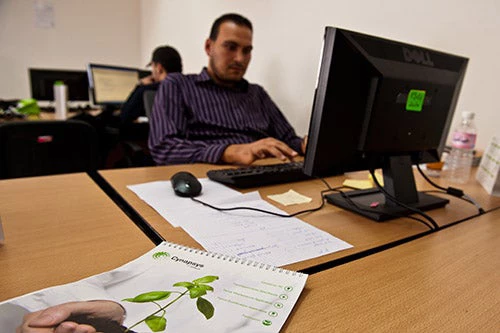Investing in human capital, through education in particular, has always been an important component of Tunisia’s national development. This blog series, ‘Education in Tunisia’, explores the role education could play in creating opportunities and promoting sustainable and inclusive growth, the challenges the education system faces in meeting these goals, and some potential solutions.
 Like many other countries around the world, Tunisia knows that the creation of knowledge requires a network of institutions of higher education and scientific research that are capable of engaging minds, exploring the unknown and then disseminating the knowledge that is thus created. In carrying out this mission, universities and related institutions should ensure that their “graduates” —degree holders and research fellows—are suited to the socio-economic environment: degree holders should be able to apply their knowledge in a specific economic context, as entrepreneurs or employees; and research outcomes should contribute either closely or tangentially to the well-being of society as well as to the protection of the natural space in which we all live.
Like many other countries around the world, Tunisia knows that the creation of knowledge requires a network of institutions of higher education and scientific research that are capable of engaging minds, exploring the unknown and then disseminating the knowledge that is thus created. In carrying out this mission, universities and related institutions should ensure that their “graduates” —degree holders and research fellows—are suited to the socio-economic environment: degree holders should be able to apply their knowledge in a specific economic context, as entrepreneurs or employees; and research outcomes should contribute either closely or tangentially to the well-being of society as well as to the protection of the natural space in which we all live.
In an effort to promote continuous improvements in the quality of higher education and scientific research (in harmony with the socio-economic environment), the Tunisian Government, as part of its institutional reform program, focuses on the progressive empowerment of educational and research institutions, and, consequently, on enhancing quality assurance in all its forms. Institutions that enjoy a higher degree of autonomy are able to operate - in terms of both skills and knowledge - with greater flexibility and dynamism, and are often able to respond innovatively to the needs of the environment in which they operate on a daily basis. At the same time, the promotion of stronger quality assurance, through the use of evaluation exercises and the dissemination of the results of such evaluations, as well as through the accreditation of courses and the acknowledgement and recognition of the value of research, will help users and taxpayers appreciate the output of universities that are accountable to them.
The empowerment of local actors must be accompanied by a re-definition of the role of the central Ministry. It should discontinue its “bottom-up” management and provide more able leadership through a “top-down” approach. For example, the Tunisian Ministry of Higher Education and Scientific Research is establishing a competitive fund - “program quality support” – under which tertiary institutions, research centers and university service bureaus select, develop and carry out projects that meet their own needs in the context of national priorities. A fresh cycle of quality support programs has just been launched, and the first results are expected soon.
The preliminary reform process must involve not only the upgrading of structures and procedures, including the drafting of laws and other regulatory texts, but, most importantly, must include an evaluation exercise to identify the main obstacles facing universities in Tunisia. Such a diagnostic assessment, which would include a benchmarking exercise to compare the output of Tunisia’s universities in terms of scientific research, technology transfer, the quality of teaching, and the suitability of degree courses, would then provide a basis on which decisions on the reforms and other priority measures and actions could be taken.
In drafting and instituting these reforms to higher education and scientific research, the Tunisian Government is urged to refrain from restricting itself to the French Model. It should draw also on the lessons from other systems of higher education, such as those in Australia, Canada, Denmark, Finland, the Netherlands, New Zealand and Switzerland, which all have relatively small, predominantly State-owned systems of higher education and which have, over the past decade, successfully introduced significant changes, achieving in the process laudable results.
 Like many other countries around the world, Tunisia knows that the creation of knowledge requires a network of institutions of higher education and scientific research that are capable of engaging minds, exploring the unknown and then disseminating the knowledge that is thus created. In carrying out this mission, universities and related institutions should ensure that their “graduates” —degree holders and research fellows—are suited to the socio-economic environment: degree holders should be able to apply their knowledge in a specific economic context, as entrepreneurs or employees; and research outcomes should contribute either closely or tangentially to the well-being of society as well as to the protection of the natural space in which we all live.
Like many other countries around the world, Tunisia knows that the creation of knowledge requires a network of institutions of higher education and scientific research that are capable of engaging minds, exploring the unknown and then disseminating the knowledge that is thus created. In carrying out this mission, universities and related institutions should ensure that their “graduates” —degree holders and research fellows—are suited to the socio-economic environment: degree holders should be able to apply their knowledge in a specific economic context, as entrepreneurs or employees; and research outcomes should contribute either closely or tangentially to the well-being of society as well as to the protection of the natural space in which we all live.
In an effort to promote continuous improvements in the quality of higher education and scientific research (in harmony with the socio-economic environment), the Tunisian Government, as part of its institutional reform program, focuses on the progressive empowerment of educational and research institutions, and, consequently, on enhancing quality assurance in all its forms. Institutions that enjoy a higher degree of autonomy are able to operate - in terms of both skills and knowledge - with greater flexibility and dynamism, and are often able to respond innovatively to the needs of the environment in which they operate on a daily basis. At the same time, the promotion of stronger quality assurance, through the use of evaluation exercises and the dissemination of the results of such evaluations, as well as through the accreditation of courses and the acknowledgement and recognition of the value of research, will help users and taxpayers appreciate the output of universities that are accountable to them.
The empowerment of local actors must be accompanied by a re-definition of the role of the central Ministry. It should discontinue its “bottom-up” management and provide more able leadership through a “top-down” approach. For example, the Tunisian Ministry of Higher Education and Scientific Research is establishing a competitive fund - “program quality support” – under which tertiary institutions, research centers and university service bureaus select, develop and carry out projects that meet their own needs in the context of national priorities. A fresh cycle of quality support programs has just been launched, and the first results are expected soon.
The preliminary reform process must involve not only the upgrading of structures and procedures, including the drafting of laws and other regulatory texts, but, most importantly, must include an evaluation exercise to identify the main obstacles facing universities in Tunisia. Such a diagnostic assessment, which would include a benchmarking exercise to compare the output of Tunisia’s universities in terms of scientific research, technology transfer, the quality of teaching, and the suitability of degree courses, would then provide a basis on which decisions on the reforms and other priority measures and actions could be taken.
In drafting and instituting these reforms to higher education and scientific research, the Tunisian Government is urged to refrain from restricting itself to the French Model. It should draw also on the lessons from other systems of higher education, such as those in Australia, Canada, Denmark, Finland, the Netherlands, New Zealand and Switzerland, which all have relatively small, predominantly State-owned systems of higher education and which have, over the past decade, successfully introduced significant changes, achieving in the process laudable results.


Join the Conversation